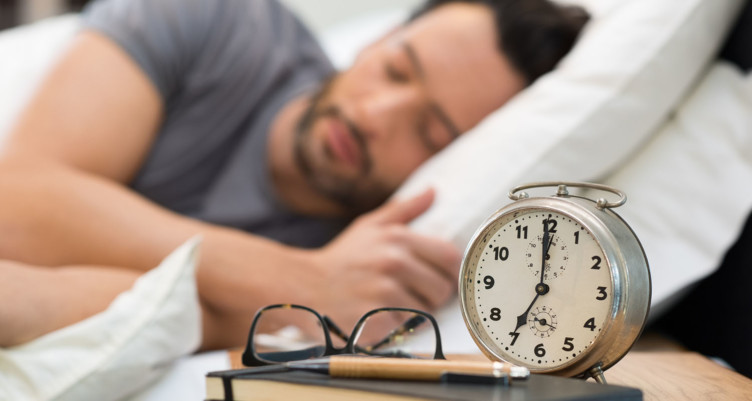5 Ways to Support Your Body’s Sleep Cycle, According to a Circadian Rhythm Expert

- Most people think that circadian rhythm refers to your sleep-wake cycle. It’s much more than that.
- Every organ in your body has its own circadian rhythm — a time when it’s more active, less active, or performs specific functions.
- Leading circadian biology researcher Dr. Satchin Panda shares top tips for supporting your whole body’s circadian rhythm.
Have you ever noticed that you feel wide awake after a late-evening trip through the grocery store? Or, do you have a tendency to wake up between 3:00 and 5:00 a.m. if you’ve had too much to drink the night before?
There’s an explanation for those, and other reasons your sleep-wake cycles get disrupted. Professor and leading researcher in the field of circadian rhythms Satchin Panda, Ph.D. has studied the effects of a wide range of inputs on your sleep-wake cycle, and he has shown the impact of these shifts on various disease processes like heart disease, diabetes, cancer, and more.
1. Spend eight hours in bed
 Many experts say that eight hours of sleep each night is ideal, but Panda makes the distinction between sleep and time in bed. He says that not everyone needs eight hours of sleep, but everyone should aim for eight hours in bed.
Many experts say that eight hours of sleep each night is ideal, but Panda makes the distinction between sleep and time in bed. He says that not everyone needs eight hours of sleep, but everyone should aim for eight hours in bed.
He says that of eight hours in bed, a person may get six or seven hours of sleep, which is perfectly fine — in fact, research shows that the healthiest people need just six hours of sleep. If you spend eight hours in bed, you’re more likely to hit your body’s unique sleep target.
Instantly download the Bulletproof Sleep Roadmap, your guide to sleeping better starting tonight.
2. Don’t snack before bed
There is a time for digestion, and there is a time for sleep. “People discovered that just like our brain, almost every organ has its own clock,” says Panda. Your stomach, your liver, your brain…every organ in your body has times when it performs certain functions. Digesting food when your digestive system is supposed to be inactive can throw off your sleep circadian rhythm, which disrupts your sleep stages and makes you feel tired the next day.
3. Lower your core temperature at bedtime
 Sleeping in a cool room, dropping the thermostat, or even showering before bed lowers your core temperature, which results in better quality sleep.
Sleeping in a cool room, dropping the thermostat, or even showering before bed lowers your core temperature, which results in better quality sleep.
“Some people like a warm shower, some like a cold shower. But the bottom line is,
whatever shower you take, your blood circulation will draw towards your skin away
from the core and that helps to cool down your body,” says Panda.
4. Avoid light two to three hours before bed
Panda explains that artificial lighting confuses your circadian rhythm, keeping you awake when your body would otherwise start winding down. With bright room lights, plus indicators and lights on devices and appliances, on top of light from TVs and computers, it’s increasingly difficult to regulate your circadian rhythm in the evening.
“There is a study that just came out showing that even one lux of light in the bedroom, which is equivalent to bright moonlight on a full moon night, for some people can disrupt their sleep,” says Panda. “If you cannot have darkness, then maybe a pair of eye seals or sleeping mask will help.”
5. Don’t wake up too early
 There’s a cultural perception that waking up early means you’re more conscientious, more hard-working, or otherwise more admirable than late risers.
There’s a cultural perception that waking up early means you’re more conscientious, more hard-working, or otherwise more admirable than late risers.
That’s simply not true. Sleep experts like Dr. Michael Breus hold that some people do their best work early in the morning, and other people find their flow later in the day or even at night.
Your circadian rhythm varies throughout your life. Teenagers, for example, tend to have a later sleep and wake cycle than other age groups. Panda describes a recent study that involved sleep tracking teenagers before and after their school start time changed from 7:30 in the morning to 8:30 in the morning. Researchers found that the later start time resulted in students getting more sleep, better grades, having fewer tardies, and even having fewer car accidents than before.
If you’re an early bird and you naturally wake up before the sun, then by all means, wake up when you’re ready. For everyone else, understand that there’s no moral value to getting up before your body clock wants to. Misaligning your schedule with your circadian rhythm chips away at your health and productivity.
Sign up for early access to sales, product launches, the latest Bulletproof news and more!



